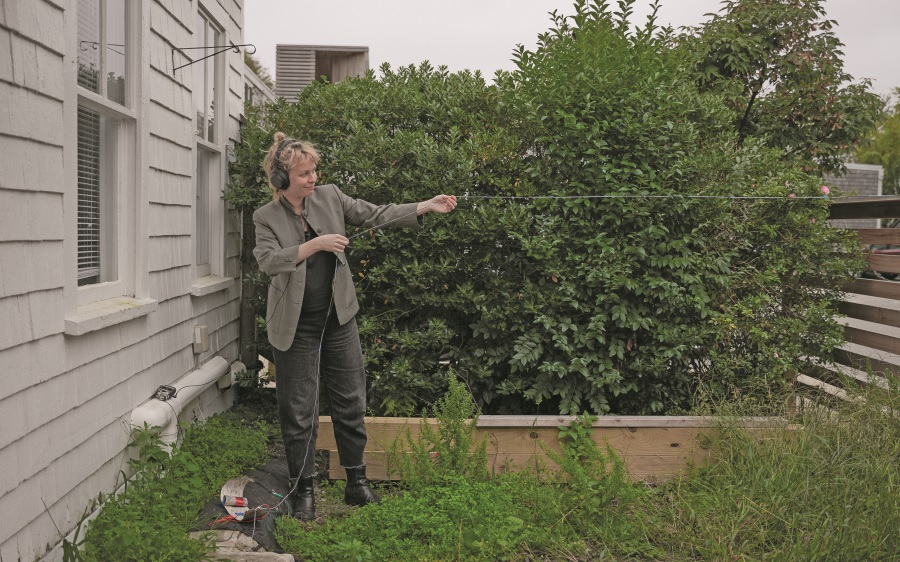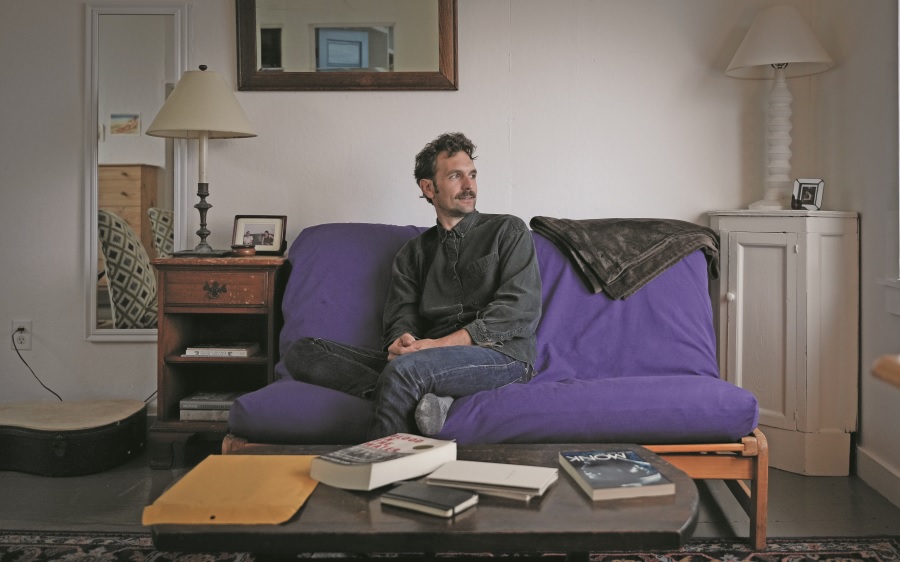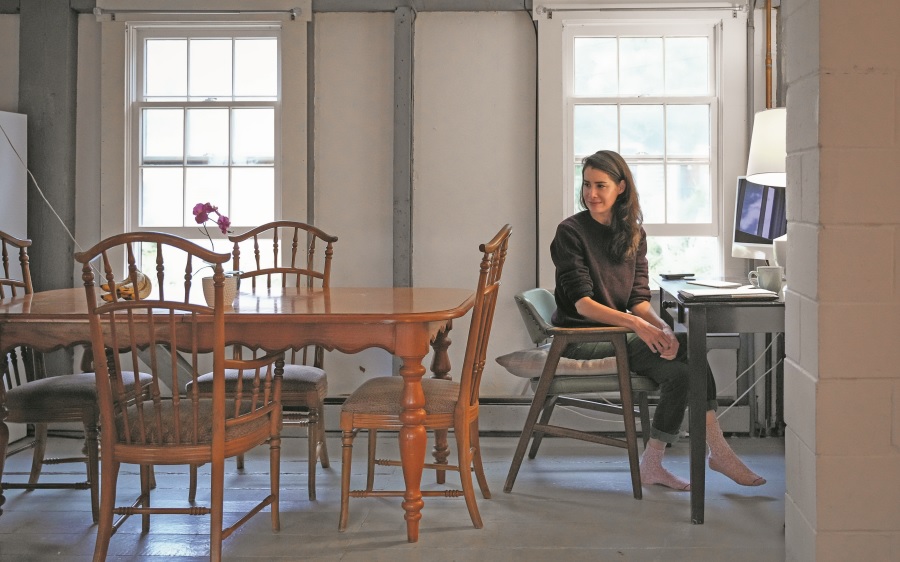A wave of doubt rolls through fiction writer Avigayl Sharp moments before she meets the page. “Writing is scary for me because I go in with absolutely nothing,” she says. “I start working on a story — I’m working on a novel right now — and I go in just with nothing. I have no idea how something is going to come out of nothing!”

Sharp’s fiction is absurd yet entirely believable. Her narrators seem to be in line to the bathroom without actually having to go. The stakes are high — even on a seemingly normal day.
“My work deals in a line between the real and the absurd,” she says. “There’s tragicomedy, and an interest in contradictions.”
Sharp is working on her book as a fellow at the Fine Arts Work Center in Provincetown. The novel follows a woman who, under mysterious circumstances, takes a job as a temporary replacement for an English teacher at an all-girls boarding school in a remote coastal tourist town. Elements of the woman’s past come back in oblique ways.
She becomes preoccupied with the life of one of her students, while parts of her own adolescence start to emerge. She compulsively reveals stories from her past to her students as well as people she meets.
Sharp says she did not think the novel would be set in a small town on the coast until she arrived in Provincetown.
“I didn’t want to write about New York,” she says. “I wanted to write about a surreal, nonexistent place, a place not quite in reality.”
She is interested in characters who, haunted by their pasts, are failing to grow up. They are often confused as to whether they are the victim or the aggressor.
“This perpetual haunting of the past ends up being projected onto real children,” Sharp says. “There are parts of people that are very young and very monstrous.”
She tends to write about women who are “behaving badly,” she says. “One’s past lives on in bizarre ways — we enact things later in life.”
Sharp’s stories are about the lives of tragic characters who are rife with internal contradictions. Her narrators struggle with self-control. They are bored people who have no sense of their own authority. They are wildly anxious — popping Xanax and eating roast beef. Their parents have had it with them. They are too smart for their own good and failing miserably at life.
Her writing takes a contemporary and absurdist approach to the 19th-century Russian literary concept of the superfluous man. Except that her characters are women — talented and capable but struggling to fit into social norms.
Sharp grew up in Chicago’s South Loop neighborhood, “those brick development townhouses — an arid, historyless part of Chicago,” she says. She had a solitary childhood. “I was this Jewish kid at a Catholic elementary school in downtown Chicago. I wasn’t taught by nuns, but there was Mass.” She recalls folding her arms across her chest to convey the message that she was not to receive the blessed sacrament.
“We didn’t have any family in the city,” she says. “I was quite lonely growing up, so I ended up reading a lot.” When she was little, her dad read The Count of Monte Cristo aloud to the family.
“I was also reading Twilight — eating that up.” She read fantasy novels like Diana Wynne Jones’s Howl’s Moving Castle. “That was huge for me as a child,” she says.
“I think I wrote in the way creative, lonely kids write,” Sharp says. “I was reading Russian literature early.” Her mother had her reading Anna Karenina when she was 11.
Sharp’s grandparents were Holocaust survivors who returned from the camps to Vilnius in Soviet Lithuania. Her mother came to the U.S. to study classical music at Juilliard in the 1970s. Growing up, Sharp studied violin and piano. She sang seriously and loved choir.
“Do not be a musician,” her parents told her. “It will not be a secure life.” She decided to be a writer.
Sharp says her older sister is a jujitsu instructor and fact-checker who has worked for The New Yorker.
Sharp has a B.A. in English from Wesleyan University and an M.F.A. from the Michener Center for Writers in Austin, Texas. At Wesleyan, she studied with Salvatore Scabona, Brando Skyhorse, and Tiffany Yanique. She cites Sally Bachner’s The Prestige of Violence: American Fiction, 1962-2007 as having an outsize influence on her literary thinking. “I took every class with her,” she says.
Her thesis adviser at Michener was Elizabeth McCracken. Covid hit during Sharp’s final semester and work on her M.F.A. went remote. Sharp moved back to New York, and she finished the degree from her friend’s converted office in Brooklyn.
Last year Sharp won the Disquiet Literary Prize for her short story “Animals After Dark,” which was published in Granta. The story centers on Ms. Stern, “an adult woman without a savings account, high on Adderall, status-obsessed, getting fat from a diet of jelly donuts and pre-packaged cold cuts,” writes Sharp. Ms. Stern finds herself in a series of minor social disasters.
“The narrator is super bright, but it doesn’t seem to be helping her,” says Gerard Breitenbeck, a jurist for the Disquiet competition. “The world that she’s in is absurd, but her reactions don’t seem like she’s crazy. Everything is askew.”
Sharp’s prose keeps up a fast pace, stopping and starting each time Ms. Stern changes her mind, leading to laughs and tragic little sobs.
Her writing requires a lot of “revving up,” she says. “I really start with a voice — I’m trying to find the texture of a voice that feels real and alive. I’m looking for something that feels like it’s touching something real.” The process requires waiting. It can take Sharp a long time, but once she hears the music of a voice and the way the voice is shaped, other pieces start to follow.
“I don’t have plot — I don’t have those things in advance,” she says. “It’s totally dark, and then slowly I can see one step ahead.”
Her practice requires faith: “You have to believe you’re going to see it all in the end even if you can’t see it while you’re working.”
Sharp works six days a week. She writes in the morning after putting her phone into a white lockbox on her bookshelf. She sets a timer on the lockbox and works for four hours. “I can’t stop telling people about the lockbox,” she says.
She pays for an app to block the internet on her laptop. “I have no self-control,” she says. “It’s amazing the gadgets you purchase to stop you from using your gadgets.”
Sharp doesn’t always spend the entire four hours writing. She might sit at her desk or walk a mile along the beach to Truro, depending on the tide. In the afternoons, she reads and makes soup.
“I’ve loved being here because I have this pure time,” she says. “The days sort of bleed into each other, and it’s like you’re almost never not in the work in a certain way. I love it.”
She says she writes a paragraph and looks at it for eight days. “I like slowly moving forward, then backward — then forward or backward,” she says. “Making adjustments — sometimes I have a negative word count for days, which is sad.
“I try to go all the way in my writing,” she says. “In my real life, I’m a very fearful person — I’m a coward. I want people to like me. I think in my work — it’s the place where I have to not be afraid. It’s the place I look truth in the eye, even if it’s terrible.”
Her stories feel deeply personal and alive. But “none of this actually happened,” she says before disappearing down Pearl Street.






